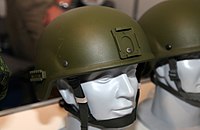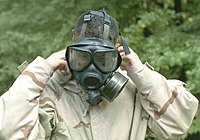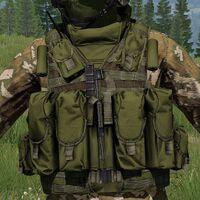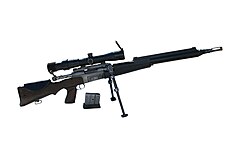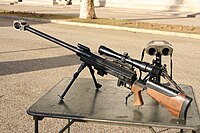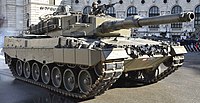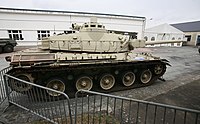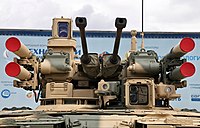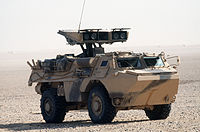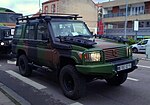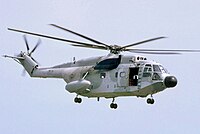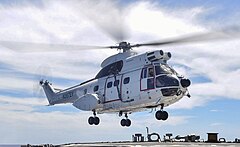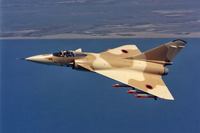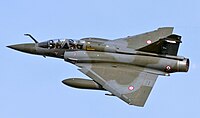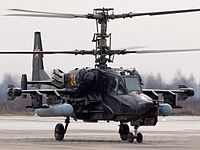United Communes Defense Forces: Difference between revisions
mNo edit summary |
|||
| Line 13: | Line 13: | ||
| current_form = | | current_form = | ||
| disbanded = | | disbanded = | ||
| branches = [[File:Messidor Army Emblem.png|23px]] [[Messidorian Army Corps|Army Corps]]</br>[[File:Messidor Naval Jack.png|23px]] [[Messidorian Navy Corps|Navy Corps]]</br>[[File:Messidor Roundel.png|23px]] [[Messidorian Air Corps|Air Corps]]</br>{{flagicon image|Black flag.svg}} [[Black Guards (Messidor Union)|Black Guards]] ( | | branches = [[File:Messidor Army Emblem.png|23px]] [[Messidorian Army Corps|Army Corps]]</br>[[File:Messidor Naval Jack.png|23px]] [[Messidorian Navy Corps|Navy Corps]]</br>[[File:Messidor Roundel.png|23px]] [[Messidorian Air Corps|Air Corps]]</br>{{flagicon image|Black flag.svg}} [[Black Guards (Messidor Union)|Black Guards]] (inactive) | ||
| headquarters = | | headquarters = | ||
| flying_hours = | | flying_hours = | ||
| Line 62: | Line 62: | ||
=History= | =History= | ||
The Messidorian Army and Navy Corps were founded in 1839, 8 years after the founding of the Messidor Union. The formation of a standing military was a contentious issue among the various syndicates who had originally called to rely upon civil militias organized at a local level rather than a central military. After the loss of northern | The Messidorian Army and Navy Corps were founded in 1839, 8 years after the founding of the Messidor Union. The formation of a standing military was a contentious issue among the various syndicates who had originally called to rely upon civil militias organized at a local level rather than a central military. After the loss of northern Kirthan in 1833, the notion that such a force could effectively protect the Union was effectively dispelled, though it took a further 6 years before the exact details of the Messidorian Armed Forces would be determined. From the outset, the Army and Navy Corps were small, professional, volunteer forces which were organized under a federal union. Merovian and later Aɣmatian factories ensured that they were well-equipped and supplied, though the forces established an enduring reputation of poor discipline. Despite their reputation, the first major deployment of the Messidorian Army Corps in the Annexation of the Timna Strip in 1919 was a great success. The Messidorian Navy Corps served nearly the entirety of its first century and a half of existence as a patrol and deterrence fleet for ships making the transit across the Periclean Sea. During the Liberation of Northern Kirthan in 1950-51, the Navy Corps ran blockades around the coast of Kirthan and prevented any seaborne assault. They also saw major surface combat during the Fourth West Scipian War. The Messidorian Air Corps was founded in 1920 and rounded out the three branches. Elements of the Messidorian intelligence services are also incorporated into the armed forces, specifically, the Special Intelligence Regiment of the Army Corps, which conducts military and signals intelligence. | ||
=Structure= | =Structure= | ||
The structure of the Messidorian Armed Forces is | The structure of the Messidorian Armed Forces is unusual for most nations but ultimately consistent with the Union's own logic. While elsewhere officers are trained and awarded a commission, and a strict military hierarchy is followed, each unit level of the Messidorian Armed Forces elect their commanders, i.e.: an infantry section elects its sergeant, a ship elects its captain, and the general staff is elected by its branch of service. Eligibility for commissioned roles is often subject to criteria of education or seniority. It is this particular element of the armed forces' structure that bewilders more disciplined military forces in the world. For their part, officers and enlisted members of the Messidorian Armed Forces hold that the system creates a greater sense of camaraderie and investment in the service. | ||
The combined armed forces | The combined armed forces are overseen by the Directorate of Defence Armed Forces Committee. The committee is chaired by the most senior of the elected members who are commanders of each of the three branches. The Director of Defence is also a member of the committee. The present chairperson of the committee is General Rezki Tinifsan. Below the committee, each branch has its own general staff composed of the commanders of its subgroups and their staff. | ||
The Army Corps is composed of twenty regiments and an air component divided among two divisions: one based in Aɣmatia and the other in Merovia. At an operational level the regiments are organized into | The Army Corps is composed of twenty regiments and an air component divided among two divisions: one based in Aɣmatia and the other in East Merovia. At an operational level, the regiments are organized into 10 brigades, six in Aɣmatia and four in East Merovia. While conscription is unconstitutional in the Messidor Union, the Black Guards were previously raised as a mass volunteer force, though they are presently inactive. There is no standing reservist force in the Army Corps. | ||
The Navy Corps operates under a single unified fleet - the Periclean Fleet. The formal organization of the fleet is much looser than the Army Corps and most of the officers maintain the rank of "Captain", taking on command of larger formations only for the duration of a particular deployment. Presently, the Navy Corps has a few active deployments in the Periclean protecting the corridor between Merovia and Aɣmatia. | The Navy Corps operates under a single unified fleet - the Periclean Fleet. The formal organization of the fleet is much looser than the Army Corps and most of the officers maintain the rank of "Captain", taking on command of larger formations only for the duration of a particular deployment. Presently, the Navy Corps has a few active deployments in the Periclean protecting the corridor between Merovia and Aɣmatia. | ||
The Air Corps has two air divisions | The Air Corps has two air divisions that are not strictly organized along geographic lines. Each division has 5 wings which may have as many as 72 aircraft each or as few as 15 according to the wing's role. Unlike both the Army Corps and the Navy Corps, the Air Corps has 6 air reserve squadrons that fly the dated but not yet obsolete {{wpl|Dassault_Mirage_III#Mirage_IIIE|AAB-F32/B3 Tiara}} fighter aircraft. | ||
==Messidorian Army Corps== | ==Messidorian Army Corps== | ||
Revision as of 04:09, 7 November 2021
| Messidorian Armed Forces | |
|---|---|
| Forces Armées du Messidor Iɣskrbiln n Mgrawi | |
| File:Messidorian Armed Forces Emblem.svg Emblem of the Messidorian Armed Forces | |
| File:Messidor Army Emblem.png File:Messidor Naval Jack.png File:Messidor Roundel.png Roundels of the Messidorian Army Corps, Navy Corps, and Air Corps | |
| Founded | 1839 |
| Service branches | File:Messidor Army Emblem.png Army Corps File:Messidor Naval Jack.png Navy Corps File:Messidor Roundel.png Air Corps |
| Leadership | |
| President of the Union | Yolande-Minerve Saverne |
| Commissioned Chairperson | General Rezki Tinifsan |
| Personnel | |
| Military age | 18-55 |
| Conscription | Voluntary service only |
| Active personnel | 102,800 total: Army Corps: 55,200 Navy Corps: 31,500 Air Corps: 16,100 |
The Messidorian Armed Forces (Audonic: Forces Armées du Messidor, Tamazight: Iɣskrbiln n Mgrawi) is the unified military forces of the Messidor Union. Each element of land, sea, and air forces are incorporated as a corps, the Army Corps, Navy Corps, and Air Corps, respectively. Service is voluntary and the Army Corps and Navy Corps do not have active reserves. The Air Corps retains a reserve fleet which is theoretically filled by commercial pilots who have signed on as reservists.
The Messidorian Armed Forces are headed by the Directorate of Defence and the Armed Forces Executive Committee. The Director of Defence is appointed by the President of the Union and is accountable to the Workers' Congress and the civilian population of the Messidor Union more broadly. The Armed Forces Executive Committee is a council of elected officers and the enlisted Corps Sergeant Majors or Corps Chief of each corps.
History
The Messidorian Army and Navy Corps were founded in 1839, 8 years after the founding of the Messidor Union. The formation of a standing military was a contentious issue among the various syndicates who had originally called to rely upon civil militias organized at a local level rather than a central military. After the loss of northern Kirthan in 1833, the notion that such a force could effectively protect the Union was effectively dispelled, though it took a further 6 years before the exact details of the Messidorian Armed Forces would be determined. From the outset, the Army and Navy Corps were small, professional, volunteer forces which were organized under a federal union. Merovian and later Aɣmatian factories ensured that they were well-equipped and supplied, though the forces established an enduring reputation of poor discipline. Despite their reputation, the first major deployment of the Messidorian Army Corps in the Annexation of the Timna Strip in 1919 was a great success. The Messidorian Navy Corps served nearly the entirety of its first century and a half of existence as a patrol and deterrence fleet for ships making the transit across the Periclean Sea. During the Liberation of Northern Kirthan in 1950-51, the Navy Corps ran blockades around the coast of Kirthan and prevented any seaborne assault. They also saw major surface combat during the Fourth West Scipian War. The Messidorian Air Corps was founded in 1920 and rounded out the three branches. Elements of the Messidorian intelligence services are also incorporated into the armed forces, specifically, the Special Intelligence Regiment of the Army Corps, which conducts military and signals intelligence.
Structure
The structure of the Messidorian Armed Forces is unusual for most nations but ultimately consistent with the Union's own logic. While elsewhere officers are trained and awarded a commission, and a strict military hierarchy is followed, each unit level of the Messidorian Armed Forces elect their commanders, i.e.: an infantry section elects its sergeant, a ship elects its captain, and the general staff is elected by its branch of service. Eligibility for commissioned roles is often subject to criteria of education or seniority. It is this particular element of the armed forces' structure that bewilders more disciplined military forces in the world. For their part, officers and enlisted members of the Messidorian Armed Forces hold that the system creates a greater sense of camaraderie and investment in the service.
The combined armed forces are overseen by the Directorate of Defence Armed Forces Committee. The committee is chaired by the most senior of the elected members who are commanders of each of the three branches. The Director of Defence is also a member of the committee. The present chairperson of the committee is General Rezki Tinifsan. Below the committee, each branch has its own general staff composed of the commanders of its subgroups and their staff.
The Army Corps is composed of twenty regiments and an air component divided among two divisions: one based in Aɣmatia and the other in East Merovia. At an operational level, the regiments are organized into 10 brigades, six in Aɣmatia and four in East Merovia. While conscription is unconstitutional in the Messidor Union, the Black Guards were previously raised as a mass volunteer force, though they are presently inactive. There is no standing reservist force in the Army Corps.
The Navy Corps operates under a single unified fleet - the Periclean Fleet. The formal organization of the fleet is much looser than the Army Corps and most of the officers maintain the rank of "Captain", taking on command of larger formations only for the duration of a particular deployment. Presently, the Navy Corps has a few active deployments in the Periclean protecting the corridor between Merovia and Aɣmatia.
The Air Corps has two air divisions that are not strictly organized along geographic lines. Each division has 5 wings which may have as many as 72 aircraft each or as few as 15 according to the wing's role. Unlike both the Army Corps and the Navy Corps, the Air Corps has 6 air reserve squadrons that fly the dated but not yet obsolete AAB-F32/B3 Tiara fighter aircraft.
Messidorian Army Corps
The Messidorian Army Corps counts over 55,200 members across two divisions; one based in Merovia and the other in Aɣmatia. The Army Corps is also supported by a number of employees and government workers. Founded in 1839, the Army Corps began as an organizing body for many armed militias across the Union. By the 1850s, the Army Corps developed into a professional fighting force. The last militia forces were disbanded or organized into professional reserves by the early 20th century.
Despite the population gap between Aɣmatia and Merovia, Army Corps personnel are distributed relatively equally between the two nations. The majority of training is conducted in southern Aɣmatia, but soldiers are trained in multiple environments. The forces of the Army Corps count twenty-two regiments. Regiments are divided into brigade groups at an operational level. Messidorian brigades are relatively large, formed typically of an armoured regiment paired with an infantry regiment plus supporting elements.
Equipment
| Model | Image | Origin | Type | Notes |
|---|---|---|---|---|
| CC-T84/B2 | Helmet | |||
| CC-XO59/A2 | Gas mask | |||
| JC-T85/B1 | Combat vest | |||
| PC-T66/B PC-T66/V |
Camouflage | In both desert tan and temperate olive |
Small arms
| Model | Image | Origin | Type | Calibre | Notes |
|---|---|---|---|---|---|
| Small arms | |||||
| FA-M45/D2 Rz Awl |
Assault rifle | 8×35mm | Standard service rifle | ||
| FR-X(O-NO)23/B3 Asmawi |
Battle rifle | 8×57mm | Former service rifle, in reserve | ||
| PA-M16/A1 Isque |
Pistol | 10×25mm | Standard service pistol | ||
| PR-M42/A2 | Revolver | 9×33mmR 9×19mm |
|||
| FR-M05/C1 Lafliš |
Precision rifle | 8×57mm | Standard precision rifle | ||
| PM-M32/B1 Imik |
Submachine gun | 10×25mm | |||
| FM-XO28/A3 Stulskabus 8 |
Medium machine gun | 8×57mm | Section support weapon and vehicle-mounted machine gun | ||
| FM-M03/A3 Stulskabus 13 |
Heavy machine gun | 13×99mm | Vehicle-mounted machine gun | ||
| FRCM-M70/A1 | Anti-matériel rifle | 13×99mm | In limited use with special forces | ||
| Mle 5/8 | Bolt-action rifle | 7.5×57mm | Former service rifle, in ceremonial use, conversion to precision rifles | ||
| LG-M58/A1 Issoufir |
Grenade mortar | 50mm | |||
| G-XNO20/A1 Dikra |
Hand grenade | ||||
Vehicles
| Model | Image | Origin | Type | Armament | Notes |
|---|---|---|---|---|---|
| Armoured vehicles | |||||
| CB-A77/A2 Mirage |
Third generation main battle tank |
|
Co-developed with the Ostrozavan BTv.78 series, the North Ottonian M15/VII series, and the Tsurushiman Type 90 | ||
| CB-A20/C3 Lancier |
Second generation main battle tank |
|
|||
| CS-A20/F2 Arbaléte |
Fire support vehicle |
|
|||
| VCI-A42/A3 Baɣu |
Infantry fighting vehicle |
|
|||
| VRR-A42/B1 Basset |
Reconnaissance vehicle |
|
VRR wheeled variant, VRC tracked variant | ||
| TB-A45/A1 Forteresse |
Armoured personnel carrier |
|
Ambulance, command vehicle, and engineering variants | ||
| Artillery | |||||
| CA-A20/D1 Martel |
Self-propelled howitzer |
|
|||
| CA-A20/E2 Zizouar |
Self-propelled SAM platform |
|
|||
| CA-A56/A2 Bernache |
Self-propelled rocket artillery |
|
|||
| CA-A45/B2 Trébuchet |
Self-propelled ATGM launcher |
|
Light ATGM launcher and 120mm mortar carrier variants | ||
| Light vehicles | |||||
| CU-C56/A1 Dromadaire |
Utility, transport, and cargo vehicles | ||||
| CU-XT53/A1 Linx |
Utility and transport vehicle | Converted civilian vehicle | |||
| Aircraft | |||||
| HU-F34/A3 Félin |
Utility helicopter | ||||
| HL-F35/A2 Frelon |
Heavy airlift helicopter | ||||
| AU-F51/A1 Cachalot |
Airlift/refueling plane | Converted civilian aircraft | |||
Field artillery and missiles
| Model | Image | Origin | Type | Armament | Notes |
|---|---|---|---|---|---|
| Artillery | |||||
| OC-M21/B1 Bélier |
Towed howitzer |
|
|||
| MI-M30/C1 Colvert |
Heavy mortar |
|
|||
| Missiles | |||||
| MP-M54/B1 | Short-range anti-tank guided missile | ||||
| MLT-XO41/A3 | Long-range anti-tank guided missile | ||||
| MCL-XW43/A2 | File:Flag of Walzenia modern.png Wazheganon | Light infrared homing missile | Licensed design produced in the Messidor Union | ||
| MAA-XW40/A1 | File:Flag of Walzenia modern.png Wazheganon | Short-range anti-air missile | Licensed design produced in the Messidor Union | ||
| MAA-M65/A1 Mika |
Medium-range anti-air missile | ||||
The Messidorian Navy Corps was formally established in 1839 and, unlike the Army Corps, had no effective predecessor. The first warships in 50 years were laid down in Aɣmatia shortly after. At present, the Navy Corps has 75 active warships in addition to several support vessels. The Periclean Fleet, the largest organizational unit of the corps, is headquartered in Port Isadore in Merovia, but the Union's shipbuilding industry is still largely based on Aɣmatia's coasts. Despite being generally restricted to the Periclean, the Navy Corps is effectively a blue water navy.
Vessels in active service
| Class | Image | Role | Displacement (standard) |
Armament | Number in service | Notes |
|---|---|---|---|---|---|---|
| Yu'tanuɣi-class amphibious assault ship | Amphibious assault ship | 16,500 tons |
|
3 | Carries up to 16 helicopters, 42 armoured vehicles, 900 infantry, and 2 Jran-class landing craft | |
| Tamdda-class destroyer | Guided-missile destroyer | 7,500 tons |
|
4 | Carries two HAS-F55/B1 Dauphin helicopters | |
| Tmassa II-class frigate | Anti-submarine frigate | 3,200 tons |
|
12 | Carries an HAS-F55/B1 Dauphin helicopter | |
| Tmassa I-class frigate | General-purpose frigate | 3,200 tons |
|
4 | Carries an HAS-F55/B1 Dauphin helicopter | |
| Bri-class corvette | Corvette | 1,100 tons |
|
16 | ||
| Tillas-class submarine | Attack submarine | 1,800 tons |
|
8 | ||
| Tuhan-class patrol vessel | Patrol vessel | 230 tons |
|
14 | ||
| Mintirzi-class minehunter | Minehunter | 570 tons |
|
8 | ||
| Awɣaman-class replenishment ship | Replenishment ship | 7,700 tons |
|
4 | ||
| Zrskradaln-class surveillance ship | Spy ship | 3,100 tons |
|
2 | ||
| Jran-class landing craft | Landing craft | 290 tons |
|
6 | ||
| HU-F34/B1 Félin |
Utility helicopter | N/A | 30 | Based on the HU-F34/A3 helicopter | ||
| HL-F35/A2 Frelon |
Heavy airlift helicopter | N/A | 8 | |||
| HAS-F55/B1 Dauphin |
Anti-submarine helicopter | N/A |
|
36 | ||
| APM-F30/C1 Périclésienne |
Maritime patrol aircraft | N/A |
|
11 |
Messidorian Air Corps
The most recent branch of the Messidorian Armed Forces is the Messidorian Air Corps. Founded in 1920 after the Annexation of the Timna Strip, the Air Corps primarily provided aerial reconnaissance. Over the next few decades, the role and capabilities of military aircraft rapidly evolved. At present, the Air Corps is the only branch of service to maintain an active reserve force, owing in part to the amount of training required to operate and maintain a fleet of aircraft. The Air Corps is organized across two wings and includes several hundred aircraft. Any aircraft seconded to the Army or Navy Corps are provided and operated by the Air Corps. In addition to its military roles, the Air Corps also provides search and rescue and emergency airlift services. Many of these additional functions are performed by reservist members.
Aircraft in active service
| Model | Image | Origin | Type | Notes |
|---|---|---|---|---|
| Ava 70 | Multi-role fighter | |||
| AAB-F47/B3 Tiara |
Multi-role fighter | In use for training and reserve squadrons | ||
| ABT-F47/A3 Ašibi |
Tactical bomber | In use for training and reserve squadrons | ||
| HA-XT51/A2 Kitakazé |
Attack helicopter gunship | |||
| HA-F66/D2 Azwu |
Amphibious assault helicopter gunship | Modified HA-XT51/A2 Kitakazé helicopter | ||
| HU-F34/A3 Félin |
Utility helicopter | |||
| HL-F35/A2 Frelon |
Heavy airlift helicopter | |||
| AU-F51/A1 Cachalot |
Airlift/refueling plane | Converted civilian aircraft, airborne early warning, electronic warfare and medevac variants |
Ranks and insignia
All three branches of service make use of the same rank insignia, though titles vary.
Officer ranks
Enlisted ranks
| OR-10 | OR-9 | OR-8 | OR-7 | OR-6 | OR-5 | OR-4 | OR-3 | OR-2 | OR-1 | |
|---|---|---|---|---|---|---|---|---|---|---|
| Insignia | File:Messidor OR-10.png |  |
 |
 |
 |
 |
 |
 |
 |

|
| Army Corps Rank | Corps Sergeant Major |
Regimental Sergeant Major |
Battalion Sergeant Major |
Company Sergeant Major |
Platoon Sergeant Major |
Section Sergeant |
Section Adjutant |
Senior Soldier |
Soldier | Recruit |
| Navy Corps Rank | Corps Chief |
Enlisted Chief |
Bridge Chief |
Deck Chief |
Watch Chief |
Watch Sergeant |
Senior Sailor |
Sailor | Junior Sailor |
Recruit |
| Air Corps Rank | Corps Sergeant Major |
Wing Sergeant Major |
Squadron Sergeant Major |
Flight Sergeant Major |
Watch Chief |
Watch Sergeant |
Senior Airperson |
Airperson | Junior Airperson |
Recruit |
